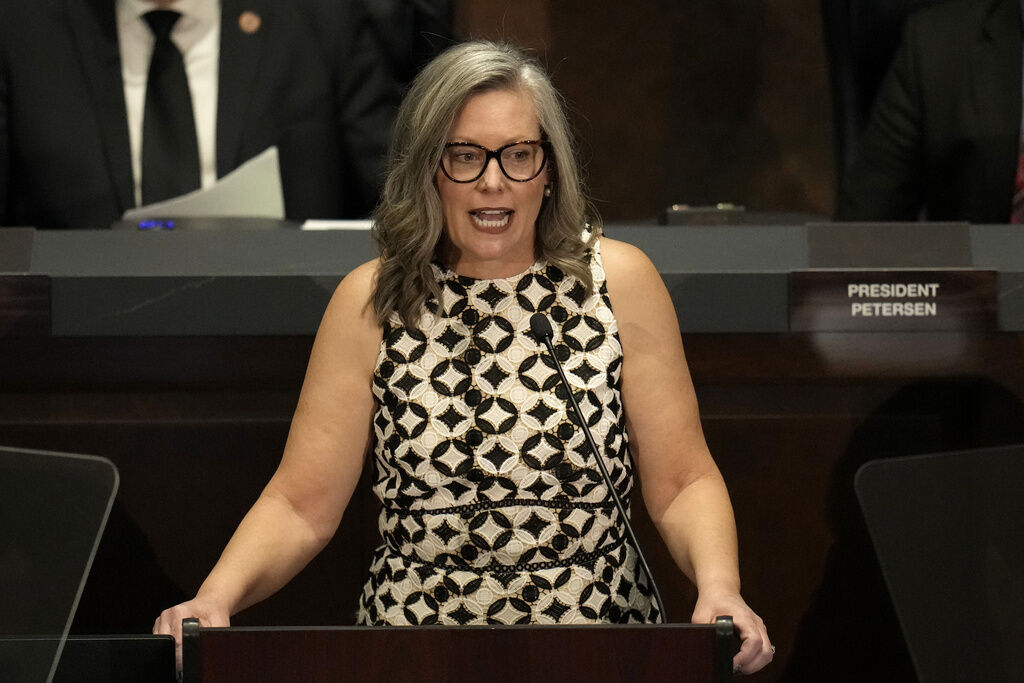PHOENIX — Gov. Katie Hobbs late Monday quashed a bid by Republican legislators to allow state and local police to arrest those who entered the country illegally.
“This bill does not secure our border,’’ the Democratic governor said in a brief veto message. She also said it “will be harmful for communities and businesses in our state, and burdensome for law enforcement personnel.’’
Hobbs also said the legislation “presents significant constitutional concerns’’ that “would be certain to mire the state in costly and protracted litigation.’’
That last point would have pretty much been a sure thing.
The Arizona legislation was modeled after a similar Texas law. And on Monday the U.S. Supreme Court blocked that Texas measure from taking effect, at least until March 13, while it gives the U.S. Department of Justice the chance to weigh in.
It also was the Department of Justice that more than a decade ago got the nation’s high court to void several key provisions of an Arizona law also designed to give police more power to detain and question people they suspected were not in the country legally.
The governor’s move was not a surprise.
Hobbs announced her intent late last month to veto the measure after the House and Senate gave it preliminary approval.
The legislation would have made it a state crime for anyone who is an “alien’’ to enter the United States from any foreign nation other than at a port of entry. It would have authorized state or local police to enforce the law.
Another provision would have allowed police to arrest anyone who is not a U.S. citizen who had been denied admission or already was ordered deported.
The crimes would have been designated a misdemeanor, which generally carries a penalty of six months in county jail and a fine. But the measure really was designed to set up a process for deporting people, with judges allowed to drop the charges against those who voluntarily agreed to leave the country.
Legislative Democrats knew Republicans had the votes for the plan. They also knew Hobbs would veto it. But that did not stop them from making floor speeches, saying it would lead to racial profiling.
None of the Republicans supporting the bill explained how a police officer would know whether an individual entered the country somewhere other than a port of entry.
Conversely, GOP lawmakers used the debate — and the foregone conclusions the bill would pass and be vetoed — from arguing failure of the federal government to secure the border entitles the state to step in.
While Monday’s veto ends discussion about this proposal, Hobbs has only limited power to shut down the debate in Arizona over border crossers and illegal immigration.
The House already approved a separate measure that would add teeth to existing laws requiring employers to use the federal E-Verify program to determine whether the people they hire are in this country legally. HCR 2060 also would extend the requirement to use E-Verify when someone applies for public benefits.
That measure, if approved by the Senate, would bypass the governor and go directly on the November ballot. Even Hobbs acknowledged Monday that such a proposal could gain significant support.
“I certainly understand that voters are frustrated and want to see something resolve this,’’ Hobbs said.
But the governor said problems at the border are a federal issue. And she was defensive about her own role in dealing with them.
“It’s a mischaracterization to say my office hasn’t done anything on border security,’’ Hobbs said. “We’ve allocated tens of millions of dollars to local communities and law enforcement to mitigate the flow of fentanyl, to address security concerns. And we’re going to continue to do that.’’
By contrast, Hobbs said, the measure to allow police to arrest border crossers didn’t “do anything to address border security issues that we’re facing.’’
With the veto, the question of how far a state can go in enforcing federal immigration laws now will turn on what happens in the Texas case.
Its law, like the one proposed here, would allow police to arrest those suspected of entering the country illegally. As with the Arizona proposal, those arrested could either face criminal charges or agree to leave the country voluntarily.
In blocking implementation of the Texas law, U.S. District Court Judge David Ezra specifically cited the 2012 ruling by the U.S. Supreme Court that voided much of what Arizona lawmakers had enacted two years earlier in their own attempts to deal with illegal immigration.
Noah Schramm, border policy strategist for the American Civil Liberties Union of Arizona, also mentioned the 2010 law in praising Hobbs’ veto Monday. He said the new measure “would have sent Arizona back to a time when racial profiling ran rampant, and the state’s reputation and economy took a brutal blow.’’
The measure Hobbs vetoed late Monday did have some exceptions.
One of them was for individuals granted asylum. But there was no such protection for those who, after crossing the border, made applications for asylum and were allowed by the federal government to remain until that was resolved, a process that could take months or years.
Sen. Janae Shamp, R-Surprise, one of the authors of the measure, released a statement calling the governor’s action “a prime example of the chaos Hobbs is unleashing in our state while perpetuating this open border crisis as Biden’s accomplice.’’
Get your morning recap of today's local news and read the full stories here: tucne.ws/morning





